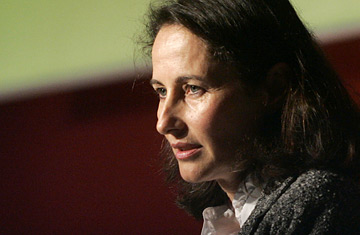
Socialist French presidential candidate Segolene Royal
Since her unlikely candidacy started gaining steam last year, Royal has had a penchant for saying almost nothing on traditional campaign topics, but launching missiles of iconoclasm where least expected. Earlier this week, she managed the difficult trick of enraging even Canada, when she offered an endorsement of what she called "the liberty and sovereignty of Quebec" after meeting with the head of the separatist Parti Québecois. Canadian Prime Minister Stephen Harper responded with a brusque reminder that meddling in domestic affairs was "inappropriate for a foreign leader," and Sarkozy's camp could hardly contain its tut-tutting over Royal's penchant for being "extremely lightweight on important and sensitive subjects," as defense minister Michle Alliot-Marie put it.
It's hardly Royal's first ham-handed approach to foreign policy, which is any French president's principal brief. Last month, she sat idly by in Lebanon when the Israeli government was compared to Nazis, then seemed to express approval for the security wall Israel is building in the West Bank. She has stuck to her internationally unique position that Iran should be denied access even to civilian nuclear power, and even praised the "swiftness" of Chinese justice on a visit this month to China. Diplomacy, then, is not her forte.
When TIME asked Royal in the summer of 2006 what she thought of Hillary Clinton, she said she'd like to meet her, even though "she holds some very right-wing positions." And what France could learn from the United States? There was a long pause before she answered: "A spirit of enterprise, perhaps?"
Royal's backers point out that French voters couldn't care less about foreign policy, and that her opponents are blowing her remarks out of proportion. True enough. But her missteps are also amplified because she is leaving the substance of her campaign unstated. "We're getting the picture, but not the sound," says Thierry Saussez, a prominent right-wing political image consultant. She is sticking to her plan to stay quiet on specific policies until February 11, once she's done more "listening" to French voters. Sarkozy is more than happy to take up the oxygen until then. His recent proposals to lower taxes on the middle class and to exempt workers from paying payroll taxes on overtime have gone over well among voters who feel their purchasing power diminishing.
The race is still tight: 52% of voters now say they would prefer Sarkozy to 48% for Royal in a head-to-head contest. But Socialists are more concerned by polls suggesting that their candidate's often random comments are undermining that ineffable quality of being "presidentiable," or enrobed with sufficient natural authority and gravitas for the top job. Her Socialist brethren used a version of that argument, often with a sexist undertone, to try to disqualify Royal last year, and it didn't work. But in France's relatively short campaign, mistakes are cumulative. Royal has inspired enthusiasm, but to recover from her current slump, she'll need to do more to inspire confidence.
